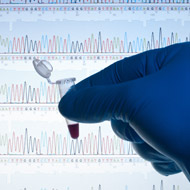
Course to give vets and livestock professionals a refresher in genetics
World-leading scientists at Scotland’s Rural College (SRUC) will deliver a ‘crash course’ in animal breeding next month.
Delivered in tandem with Agrimetrics, Vetnomics is intended for practising vets, their clients, interested farmers, retailers, genomic services providers and breeding companies.
The course will give vets and livestock professionals a refresher in basic genetics - from the latest developments in genotyping and sequencing to the best assessment and management of animals based on their genetic merit.
Course organiser Dr Steph Smith said the programme is designed to bring attendees up to speed on the application of genomics by taking them away from their day jobs for as short a time as possible.
“Vetnomics provides a comprehensive but condensed introduction to genetics and genomics in animal breeding and their use in practice in just two days,” she said.
The course will include a practical demonstration by Neogen, a company that provides genomics services for agricultural, livestock and food customers in Europe.
SRUC livestock expert Professor Mike Coffey, who will be helping to deliver the course, said: “The practical application of science is playing an increasingly important role in modern farming. Genomic technologies can help improve and safeguard animal health and welfare through better breeding and management.
"Vets are the most trusted farm advisers so need to know what to advise on genomics. Through the interdisciplinary approach of Vetnomics, we hope to share important messages from animal genetics research, give confidence in emerging technologies and refresh and inform vets as to the underlying mechanisms of genetic progress for data interpretation and discussion with farmers."
Vetnomics is available online or through a two-day residential. It will be held at the Norton House Hotel, Ingliston, Edinburgh, on 22 and 23 November.



 RCVS Knowledge has called on vet practices to audit their post-operative neutering outcomes.
RCVS Knowledge has called on vet practices to audit their post-operative neutering outcomes.